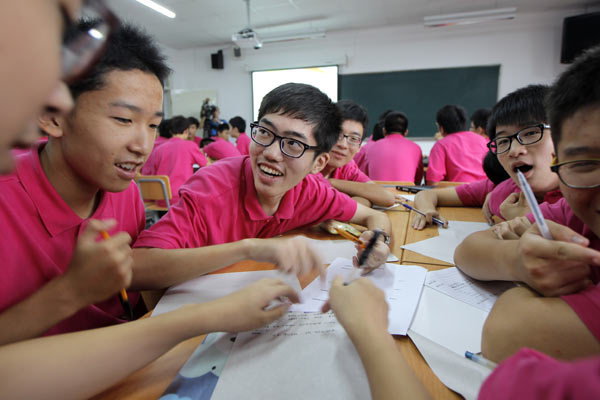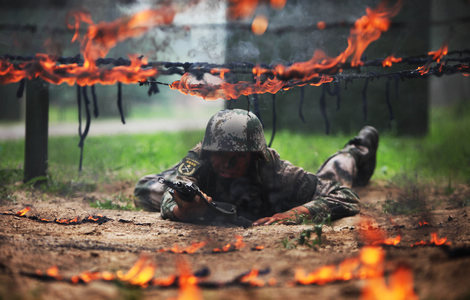It's a guy thing at new high school
Updated: 2012-09-17 01:49
By WANG HONGYI in Shanghai (China Daily)
|
||||||||
Sixty-four boys have spent their first two weeks of high school at Shanghai's first all-boys school, whose creation at the beginning of the month has been a topic of widespread attention and debate.
 |
|
Students in an all-boys class at Shanghai No 8 High School on Thursday. GAO ERQIANG / CHINA DAILY |
"I don't feel at all uncomfortable here. Actually, we can openly express ourselves," said 15-year-old Qin Jiajie. "Sometimes, I get a little nervous and shy around girls."
Shanghai No 8 High School's first boys-only campus in the city is an experimental program that attempts to solve the so-called boys' crisis in academic performance and cultivate masculinity. A phenomenon that has long been discussed, the boys crisis refers to the tendency of boys to be outperformed and overshadowed by girls at middle school.
This year, 272 boys applied for slightly more than 60 places in two classes in the school, while the parents of many more had a wait-and-see attitude toward the initiative.
"These students have demonstrated their own strengths, which we could already see in the interviews. They are very bright and energetic, and they have a wide range of knowledge that goes beyond textbooks," said Lu Qisheng, school principal.
"Courses here are interesting and don't just stick to the books. And we have more athletics and survival training activities. We all like the courses," said Li Ruomeng, a 15-year-old student. "I told my old classmates at the junior middle school about a lot of the courses and activities, which they don't have. They're curious and a little jealous," Li said with triumphant smile.
A China Daily reporter sat in on one class, which was designed to guide the boys' development and was based on boys' psychology.
In the classroom, more than 30 students watched a short film about a man whose hands were unusually small, due to a rare congenital condition, and who became a successful tailor after he discovered he had unique sewing skills because of his hands.
The boys were in fits of laughter as the story unfolded. After that, they were divided into four teams and had a group discussion about why the hero could become successful.
"We want to open their eyes through this class and make them understand themselves. Everything has a good side," said the teacher, Ding Ye.
The school's teaching methods and curriculum were designed to accommodate boys' psychological and physiological characteristics, concentrating on cultivating character and social responsibility.
The teaching method steers clear of rote memorization, which boy students are usually not good at.
Lu, in his 50s, has a male son who now studies in Tsinghua University, one of the top universities in China. Lu's experiences as an educator and father made him believe that students should be taught differently according to their characters.
"We want to help each boy develop his special talents to the utmost, instead of placing an emphasis solely on grades," Lu said.
The all-boys school has been a hot topic in the city for several months and its creation has not been welcomed by everyone.
Liu Yan, a parent, firmly opposes the idea.
"It might reduce their ability to communicate with the opposite sex," she said. "To keep boys away from girls might cause other problems, too, that could be more serious than the boy crisis."
But boys don't seem to agree.
Li said he felt proud when he told his former classmates about his high school. "I already mingle freely with my new classmates. All of the students are boys here. We're not prudish at all," he said.
"The courses are only given in this school. They give us a chance to give more thought to life and the future," said Chen Xidong, 15. "That's the reason I want to study here. My parents support my choice."
Most of the boys enrolled in the school are there of their own will and with the support of their parents, teachers said.
"Many parents have become more open-minded about the boys-only classes. They want their children to fully develop masculine strengths through the single-sex school," Lu said.
In recent years, the idea of the boys crisis has been gaining ground in China, and some experts have said a steady deterioration in masculinity is evident in a physically and emotionally weak appearance of Chinese boys.
Wang Ronghua, director of the Shanghai Education Development Foundation, has long maintained that the underperformance of boys in schools will negatively affect scientific and technological innovation in China.
He advises gender-specific education for male students while simultaneously lowering the threshold for male students to enter college.
"Applying different pedagogical methods according to students' different characteristics is very important. Boys need education methods that are suitable to them," said Wen Jun, director of the Institute of Sociology of East China Normal University.
"But further research is needed to determine whether it's necessary to send students to single-sex schools," he said.
"It takes time for parents to accept such new classes and different teaching approaches. After all, it's still very new in China," Lu said.
Contact the writer at wanghongyi@chinadaily.com.cn











